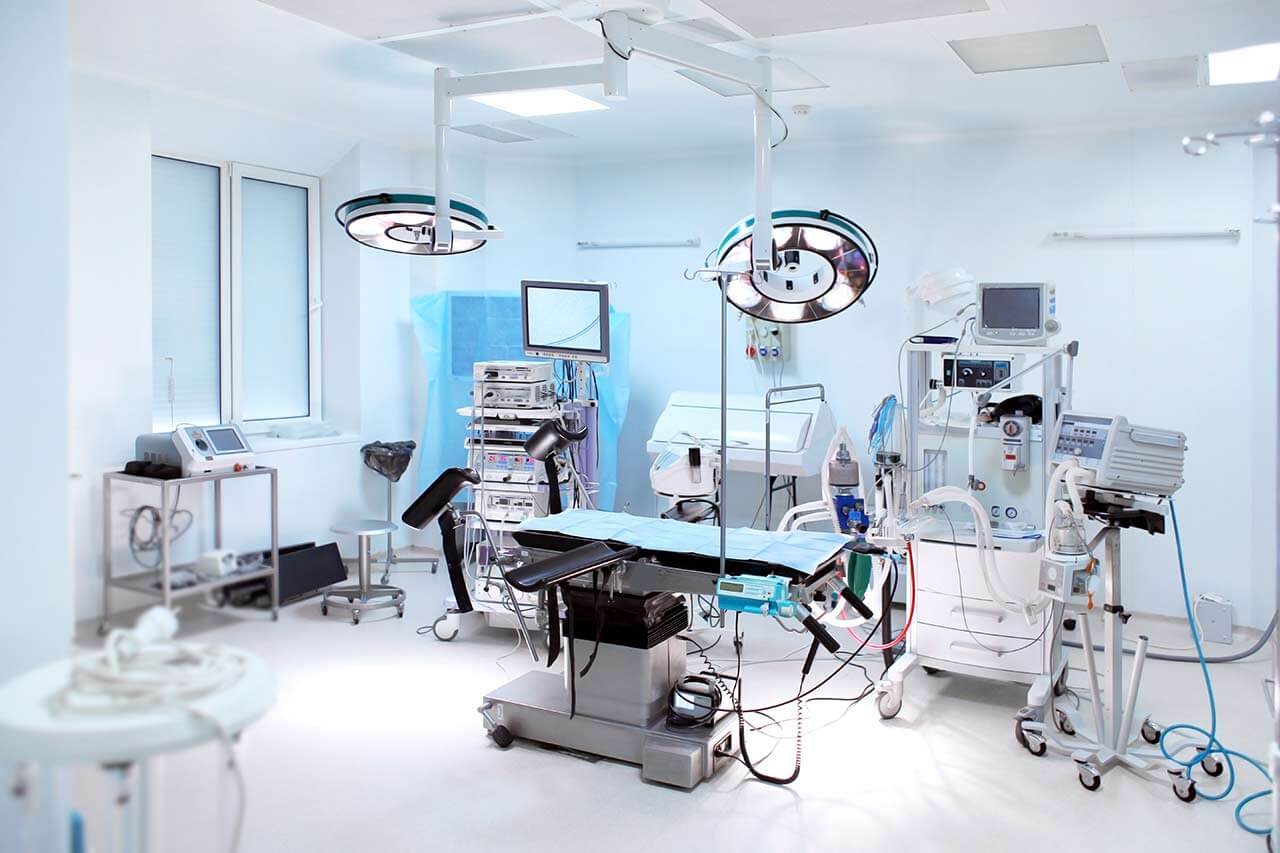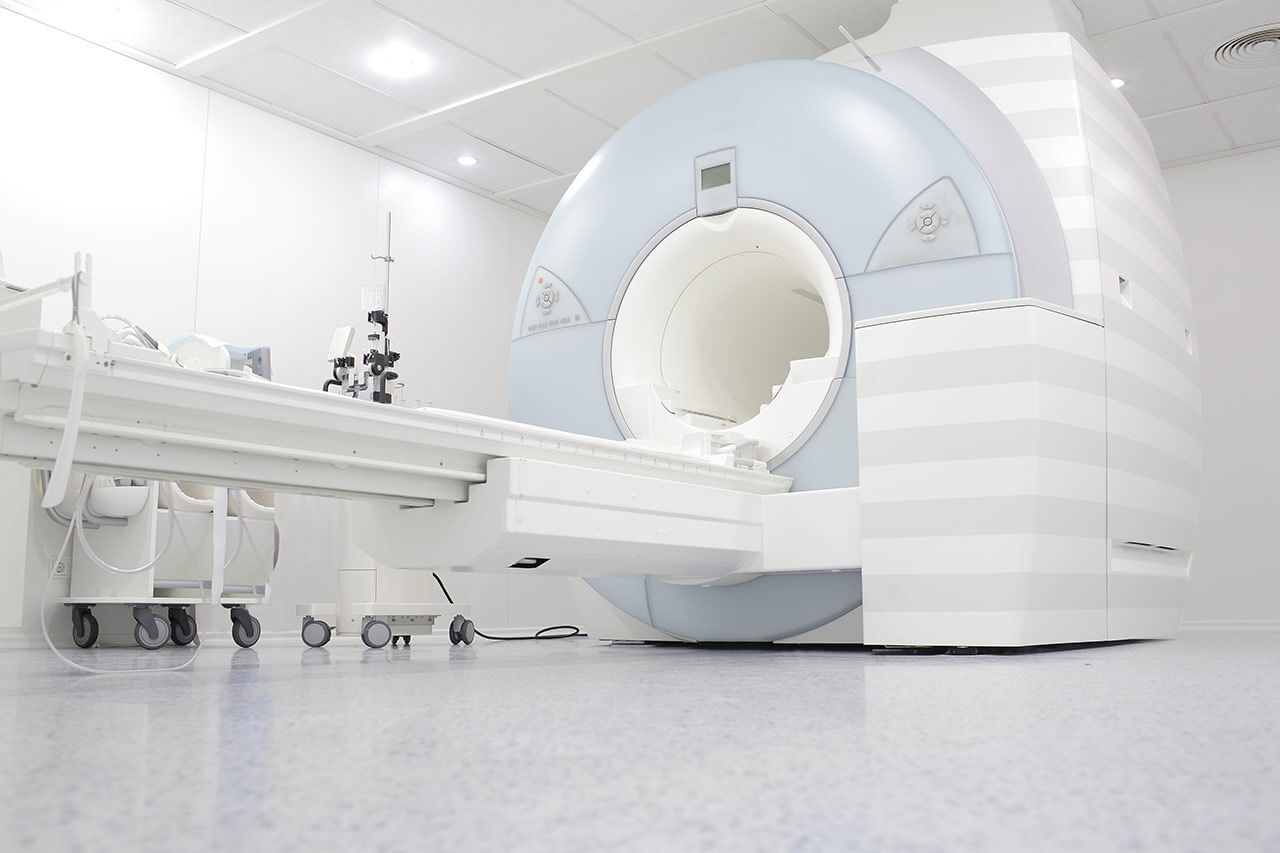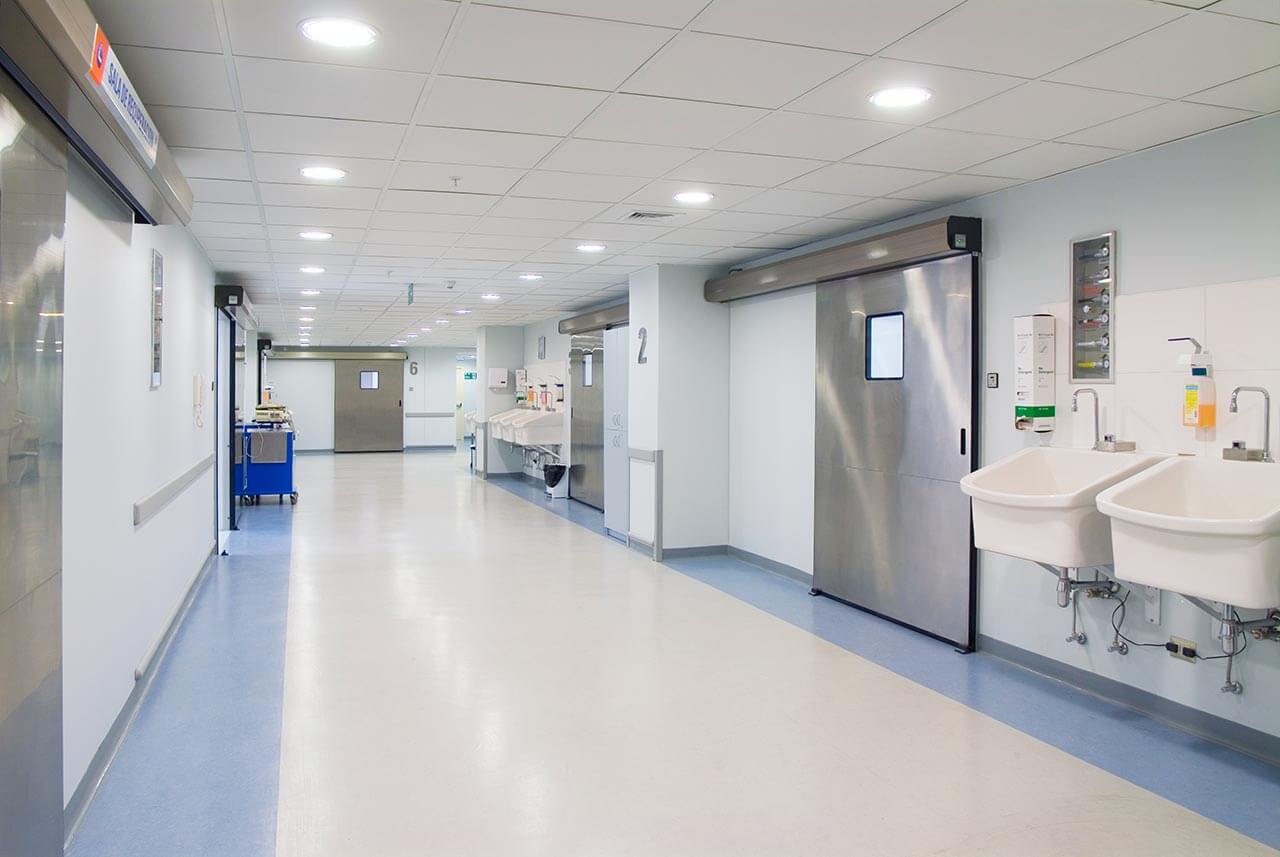
The program includes:
- Initial presentation in the clinic
- clinical history taking
- review of medical records
- physical examination
- laboratory tests:
- complete blood count
- general urine analysis
- biochemical analysis of blood
- TSH-basal, fT3, fT4
- tumor markers
- inflammation indicators (CRP, ESR)
- indicators of blood coagulation
- abdominal ultrasound scan
- CT scan/MRI or PET-CT of abdomen
- preoperative care
- cytoreductive surgery to remove visible tumors
inside the abdomen and HIPEC - histological and immunohistochemical
examination of removed tissues - symptomatic treatment
- cost of essential medicines
- nursing services
- stay in the hospital with a full board
- accommodation in a 2-bedroom ward
- elaboration of further recommendations
How program is carried out
During the first visit, the physician will conduct a clinical examination and go through the results of the available diagnostic tests. After that, you will undergo the necessary additional examination, such as the assessment of liver and kidney function, ultrasound scan and tomography of the abdominal organs. Based on the results of the examination, the physician will choose the surgical technique and the type of anesthesia. After that, preparation according to the preoperative standard will start.
Cytoreductive surgery begins with general anesthesia. The intervention is performed as open surgery, i.e. through the incision in the anterior abdominal wall, so that the surgeon can carefully examine the peritoneum and the surface of the abdominal organs. The surgeon removes affected by the malignant process areas of the peritoneum and metastases in other internal organs. This stage of the operation can take several hours, since the overall effectiveness of the treatment depends on the completeness of the malignant tissues removal.
At the next stage of the operation, the surgeon inserts several catheters into the abdominal cavity. Through the catheters, a heated solution of a chemotherapy drug is pumped inside. The special system maintains the required temperature (42-43 degrees Celsius), pressure and circulation rate of the medicinal solution. The solution mechanically flushes out blood clots and remnants of malignant tissues, and a heated chemotherapy drug destroys micrometastases in internal organs and lymph nodes (micrometastases can’t be detected by the naked eye).
After 1-1.5 hours, the chemotherapy drug is removed from the abdominal cavity and the abdominal cavity is washed with saline. After that, the surgeon removes the catheters and sutures the incision of the anterior abdominal wall.
After the completion of the operation, you will be transferred to the ward of the intensive care unit, under the round-the-clock supervision of doctors and nurses. In 1-3 days after the operation, your drains will be removed and you will be transferred to a regular ward for further recovery. The whole treatment takes 10-12 days on average.
Finally, the attending physician will evaluate the results of control examinations, schedule the date of discharge from the hospital and give you detailed recommendations for further follow-up and treatment.
Required documents
- Medical records
- X-ray examination, MRI/CT scan (if available)
- Pleural biopsy (if available)
Service
You may also book:
 BookingHealth Price from:
BookingHealth Price from:
About the department
The Department of Cardiac Surgery at the University Hospital Halle (Saale) specializes in a full range of cardiac surgical procedures. The medical facility performs operations for ischemic heart disease, valvular heart disease, arrhythmias, heart failure, aortic aneurysms, and aortic dissections. The department's cardiac surgeons have successful experience implanting mechanical circulatory support systems in patients with heart failure: Impella®, ProtekDuo®, and LVAD devices are implanted here. Of particular interest is minimally invasive surgery, which, in addition to an optimal functional outcome, ensures minimal trauma rate, rapid recovery, and the absence of cosmetic defects. In cooperation with interventional cardiologists, the department's surgeons also perform hybrid heart operations, combining catheter-based and classical surgical techniques. The department has the prestigious DIN EN ISO 9001:2015 certificate, given only to the best clinics with exceptional quality of medical services. The department also has the status of a national Heart Failure Center, certified by the German Cardiac Society (DGK) and the German Society for Thoracic and Cardiovascular Surgery (DGTHG). The department is headed by Prof. Dr. med. Gábor Szabó.
The medical facility provides qualified medical care for patients with aortic, mitral, and tricuspid valve disease. Heart valve repair and replacement procedures are performed using minimally invasive techniques without opening the sternum. These procedures are characterized by a low trauma rate while providing excellent functional and aesthetic results. When a heart valve defect is detected, the department's cardiac surgeons strive to preserve the patient's own heart valve. Therefore, they prefer repair surgery whenever possible, with valve replacement surgery as the last line of treatment. Functional outcomes after heart valve repair are better than after replacement surgery, and the patient does not need to take anticoagulants. In addition, the incidence of complications and the risk of bleeding and embolism are much lower after heart valve repair than after replacement with a prosthesis.
The department's cardiac surgeons work hand in hand with cardiologists, allowing for a comprehensive diagnosis of the heart and the development of the most effective treatment plan. Together, the specialists perform hybrid procedures that combine catheter-based and classical surgical techniques. The most popular of these are transcatheter aortic valve implantation (TAVI) to treat aortic stenosis and the MitraClip procedure to treat mitral regurgitation. TAVI and MitraClip procedures are performed using catheter-based techniques without a single incision in the chest and without connecting the patient to a heart-lung machine.
The department performs coronary artery bypass grafting procedures almost daily to treat coronary artery disease (CAD), a heart pathology caused by impaired blood supply to the myocardium due to stenosis or obstruction of the coronary arteries. The clinical manifestations of CAD are quite diverse, ranging from acute manifestations in the form of myocardial infarction or sudden cardiac death to the development of severe chronic diseases such as angina pectoris, chronic heart failure, and postinfarction cardiosclerosis. In many cases, coronary artery disease progresses slowly, and the patient may have no symptoms for years. Electrocardiography, echocardiography, exercise stress testing, Holter ECG monitoring, and coronary angiography are used to confirm the diagnosis. The first-line treatment is drug therapy. In the early stages of coronary artery disease, balloon angioplasty with stenting of the coronary arteries is also effective. This is an endovascular treatment method. The last-line treatment is coronary artery bypass grafting (CABG). It should be noted that this surgery is one of the most popular in cardiac surgery. The essence of the operation is to create a bypass for blood flow around the affected stenotic or occluded segment of the coronary artery. The department's cardiac surgeons perform CABG using classical open surgical techniques (with a sternotomy and the use of a heart-lung machine) and minimally invasive techniques (on a beating heart, surgical approach is provided through minithoracotomy). The optimal surgical technique for each patient is determined individually based on the results of a preliminary diagnosis.
The department's surgical services include the following options:
- Surgery for diseases of the aortic, mitral, and tricuspid heart valves
- Heart valve repair surgery
- Heart valve replacement surgery, including innovative TAVI and MitraClip procedures
- Surgery for ischemic heart disease
- Classical coronary artery bypass grafting with opening of the sternum
- Minimally invasive coronary artery bypass grafting
- Surgery for thoracic aortic aneurysm and thoracic aortic dissection
- Surgery for arrhythmia: pacemaker and defibrillator implantation
- Surgery for heart failure: implantation of mechanical circulatory support systems (Impella®, ProtekDuo®, and LVAD)
- Other heart surgical procedures
Curriculum vitae
Higher Education and Professional Career
- Since 01.05.2020 Department of Cardiac Surgery, University Hospital Halle (Saale).
- 2015 Deputy Head Physician, Managing Senior Physician and Director of the Program for Minimally Invasive Surgery and Transcatheter Heart Valve Implantation, Department of Cardiac Surgery, University Hospital Heidelberg.
- 2014 Founder and Director of the Clinical Research Center, Department of Cardiac Surgery, University Hospital Heidelberg.
- 2013 Certificate "Healthcare management competence level III".
- 2012 Certificate "Healthcare management competence level I and II".
- 2011 Certified Physician Examiner.
- 2010 Managing Senior Physician, Department of Cardiac Surgery, University Hospital Heidelberg.
- 2007 Certificate "Management in Healthcare Facilities".
- 2007 Member of the Doctoral Award Committee, Faculty of Medicine, University of Heidelberg.
- 2006 Senior Physician, Department of Cardiac Surgery, University Hospital Heidelberg.
- 2006 Board certification in Cardiac Surgery, additional qualification in Cardiac Intensive Care.
- 2004 Senior Physician, Department of Cardiac Surgery, University Hospital Heidelberg.
- 2004 Director, Section for Experimental Cardiac Surgery, University Hospital Heidelberg.
- 2001 Visiting Scientist, Inotek Pharmaceuticals, Beverly, MA, USA.
- 2000 Visiting Scientist, Semmelweis University, Budapest, Hungary.
- 1999 Visiting Scientist, Inotek Pharmaceuticals, Beverly, MA, USA.
- Since 1996 Research Fellow, Department of Cardiac Surgery, University Hospital Heidelberg.
- 1995 - 1996 Internship, Department of Cardiac Surgery, University Hospital Heidelberg.
- 1992 - 1994 Scholarship, Ruprecht Karl University of Heidelberg.
- 1987 - 1994 Medical studies, Semmelweis University, Budapest, Hungary; Ruprecht Karl University of Heidelberg, Heidelberg, Germany; University of Palermo, Palermo, Italy.
Academic Career
- Since 01.05.2020 W3 Professorship for Cardiac Surgery, Martin Luther University Halle-Wittenberg.
- 12.12.2006 Extraordinary Professorship, Ruprecht Karls University of Heidelberg.
- 05.07.2004 Habilitation and Venia legendi in Cardiac Surgery, Ruprecht Karl University of Heidelberg. Subject: "Pathophysiology of the donor heart: development of new concepts for donor conditioning and organ preservation in the context of heart transplantation".
- Since 2002 Lecturer in the Doctoral Program, Semmelweis University, Budapest, Hungary.
- 14.07.1999 PhD, Semmelweis University, Budapest, Hungary. Subject: "Pathophysiology of the donor heart: brain death and ischemia/reperfusion".
- 18.09.1994 Thesis defense with honors, Semmelweis University, Budapest, Hungary. Subject: "The influence of atrial fibrillation on coronary circulation".
Awards, Honors, and Distinctions
- 2016 Publication Award, Semmelweis University, Budapest, Hungary.
- 2012 Award, German Society for Thoracic and Cardiovascular Surgery (DGTHG).
- 2008 Poster Award, European Society for Surgical Research (ESSR).
- 2007 Franz Köhler Prize, German Society for Thoracic and Cardiovascular Surgery (DGTHG).
- 1997 Young Investigator Award, Hungarian Society of Cardiology (MKT).
- 1997 Hancock Award, German Society for Thoracic and Cardiovascular Surgery (DGTHG).
- 1992 Thesis Award, Semmelweis University, Budapest, Hungary.
Peer Review Activities
- American Journal of Physiology.
- American Journal of Transplantation.
- Cardiovascular Research.
- Circulation.
- European Journal of Cardiothoracic Surgery.
- Journal of Heart and Lung Transplantation.
- Journal of Thoracic and Cardiovascular Surgery.
- The Thoracic and Cardiovascular Surgeon.
- Transplantation.
Memberships in Professional Societies
- German Society for Thoracic and Cardiovascular Surgery (DGTHG).
- European Association for Cardio-Thoracic Surgery (EACTS).
- European Society of Cardiology (ESC).
- Hungarian Society of Cardiology (MKT).
- German Cardiac Society (DGK).
- International Society for Heart and Lung Transplantation (ISHLT).
Photo of the doctor: (c) Universitätsklinikum Halle (Saale)
About hospital
According to the prestigious Focus magazine, the University Hospital Halle (Saale) is one of the best medical institutions in Germany!
The history of the hospital goes back more than 300 years, and during this time it has managed to gain an excellent reputation not only in Germany, but also throughout the world. The hospital positions itself as a specialized healthcare facility for the treatment of severe and rare diseases and injuries. The hospital provides medical care to patients of all ages in compliance with the latest scientific achievements. The hospital is distinguished by successful research activities, especially in the field of cardiovascular diseases and oncopathologies – the specialists in these areas have made significant contributions to the development of the very latest diagnostic methods and therapeutic approaches.
The University Hospital Halle (Saale) has 30 specialized departments representing almost all areas of modern medicine, as well as 17 narrowly focused institutes. About 35,000 patients receive qualified medical care of European standards in the hospital every year, and more than 212,000 patients are served on an outpatient basis. This number of patients is evidence of the high efficiency of medical services and the excellent image of the hospital in the international medical arena; patients from all over the world regularly seek medical attention here.
Some of the hospital's structural units deserve special attention. For example, the Central Emergency Department (the largest in Saxony-Anhalt), modern dental clinics, the Perinatal Center, and the Transplant Center, which has a history of more than 40 years. The Transplant Center performs more than 40 kidney transplants annually, most of them from living donors.
Thanks to the use of the latest medical technologies and the availability of state-of-the-art equipment, many previously high-risk surgeries and procedures can now be performed in the hospital using sparing techniques. In this context, hybrid cardiac surgery and robotic surgery using the innovative da Vinci Si® system in urology are worthy of mention.
An integral part of the successful clinical practice of the University Hospital Halle (Saale) is the availability of experienced and competent medical staff. The total number of employees at the hospital is more than 4,450. Many physicians are known far beyond the borders of Germany: they regularly conduct important research that enables the development of modern medicine. In addition, the hospital specializes in training medical students, so qualified doctors and professors are willing to pass on their experience to the younger generation.
The hospital has many quality certificates such as DIN EN ISO 9001:2015 certificate, German Cancer Society (DKG) certificate, JACIE certificate, EndoCert certificate, ClarCert certificate, German Spine Society (DWG) certificate, German Trauma Society (DGU) certificate, CERT iQ certificate, LGA InterCetert certificate, and others.
Photo: (с) depositphotos
Accommodation in hospital
Patients rooms
The patients of the University Hospital Halle (Saale) stay in comfortable single, double, and triple rooms with a modern design. All patient rooms have an ensuite bathroom with a toilet and a shower. The standard patient room includes a comfortable automatically adjustable bed, a bedside table, a wardrobe, a table and chairs for receiving visitors, a TV, a radio, and a telephone. The patient rooms have access to Wi-Fi. For safety reasons, the use of laptops and cell phones is prohibited in some areas, including the intensive care units. The hospital also offers enhanced-comfort patient rooms.
Meals and Menus
The hospital offers delicious and well-balanced meals three times a day: breakfast, lunch, and dinner. Patients and their companions can choose from three daily menus, which always include dietary dishes. If necessary, an individual menu can be prepared for the patient. Children are offered a special menu with healthy and tasty dishes, rich in nutrients necessary for a growing body.
Further details
Standard rooms include:
![]() Toilet
Toilet
![]() Shower
Shower
![]() Wi-Fi
Wi-Fi
![]() TV
TV
Religion
Religious services are available upon request.
Accompanying person
Your accompanying person may stay with you in your patient room or at the hotel of your choice during the inpatient program.
Hotel
Your accompanying person may stay with you in your patient room or at the hotel of your choice during the inpatient program.




